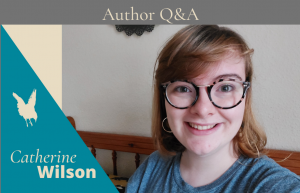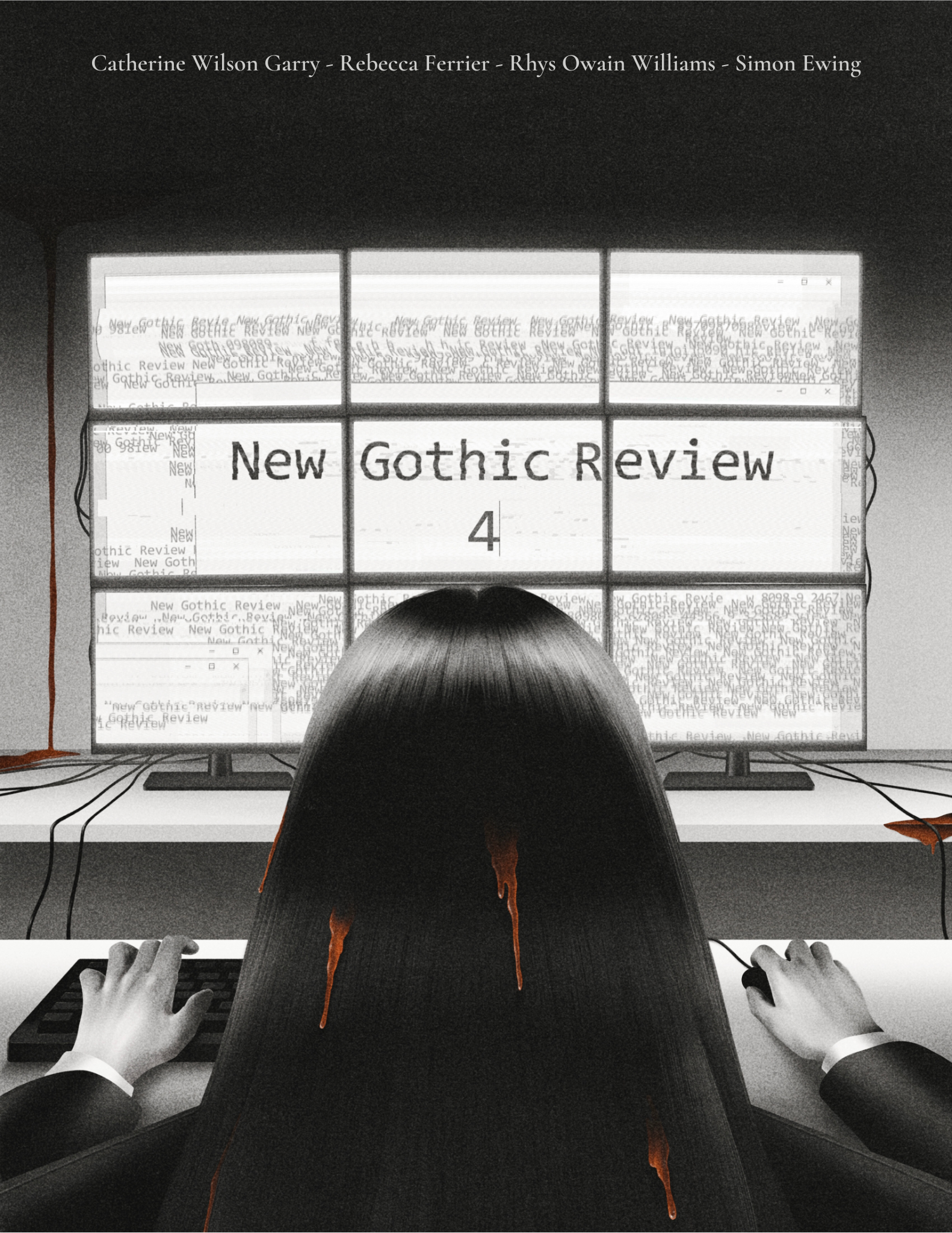
Catherine Wilson is a Scottish spoken word poet and writer originally from the Highlands, now based in Edinburgh. Her work has been published by Extra Teeth magazine, Gutter magazine, The Scotsman and The Scottish Book Trust. In 2018, her work was selected by the E.U.N.I.C’s Transpoesie Festival to be displayed across Brussel’s transport system.
We’re pretty faithless to formal definitions of what’s gothic and what isn’t. If you strip away the tropes and the familiar imagery, what do you feel is at the heart of gothic literature?
To me, gothic is about extreme emotion – whether love, fear, grief or awe – with incredibly high stakes beyond the realm of “human”.
When writing horror, a common pathway is to examine the everyday and make it threatening through subverting what “should” happen. Houses get broken into, children turn on their parents, the quiet Christian suburbs are no longer safe! In short, social rules are broken.
Gothic throws that rule book out the window from the start. Gothic protagonists face the unconquerable: supernatural evils, ancient powers, God, the natural world. There’s a lot of existentialism there! Evil is no longer individual humans doing bad things but something older, more amorphous, harder to pin down (and so, defeat or tame).
Similarly, we can use the gothic to understand overwhelming feelings that feel impossible to navigate – depression, grief, or characters who are driven to extreme acts out of devotion, love or conviction.
For me the gothic is vastly more scary, but also an incredibly versatile tool we can use as writers. Films like Us (2019), The Invisible Man (2020) and The VVitch (2015) are gothic but at the same time help us understand something about how society works. In them, the unconquerable evils are entrenched systems like misogyny and racism. There’s something true to life in that – most harm in our lives is caused by powerful systems rather than specific bad apples.
How do you feel “Thicker Than Water” fits into that conception of gothic literature?
I’m really fascinated by the concept of the sublime which you see run through a lot of gothic fiction. Put simply, it’s the idea of something so great in beauty that it is unmeasurable. This inability to put it into words makes it both inspiring and terrifying.
I adore being beside the sea and spent a lot of my childhood on ferries to Scottish islands, mainly the Orkney islands. During a storm we would have to lie on the floor whilst bar glasses smashed on the floor. There’s a moment during the swell where the ferry feels as if it’s floating before it smacks down on the waves. It’s terrifying and the human body doesn’t know how to cope. We get seasick in rebellion of how unnatural the power of nature feels (or, in my mother’s case, fall and break a rib). Despite the technology and engineering behind a huge ferry, something as simple as the movement of vast amounts of water shows how at mercy we are as humans.
I think grief is similar. All grief comes from love that has been denied or lost. Something beautiful becomes debilitating. Grief can totally consume us and take us out of our own humanity. We stop eating or sleeping or care for ourselves, and keen like animals. I was interested in putting together a vast power of nature with vast and powerful emotion.
Can you speak to any inspirations or influences for the piece?
I started writing this story when I was staying in Stenness on the Orkney islands over the gap between Christmas and New Year. The first ideas that formed this piece came from our bus route which wound around the coast. I would stare into the choppy sea and think about how it was beautiful but threatening – as if it would creep aboard the bus.
I also keep a diary books and films, so I can always see what was floating around at the time I write something! I had just re-read Rob Davis’s incredibly dark and enthralling The Motherless Oven series which oozes with gothic worldbuilding. Children build their own inanimate object “parents”, it rains knives and the protagonist knows the day he will die.
I had also recently read – and adored – Kirsty Logan’s collection of feminist short stories Things We Say in the Dark and, weirdly enough, Wild by Cheryl Strayed which is an autobiographical account of her decision to hike 1,100 miles alone. It’s not exactly what you’d think would go into the inspiration for a gothic story, but there’s a lot in there about how incredible nature is and how easily it can kill us.
What piece of writing advice do you hold most dear?
Maybe this is cheating, because this is one I kind of came up with for myself. When I started writing I decided that I was going to let myself be bad at this when I started and not place any ideas or expectations about its reception.
I think writers, or artists, can put too much pressure on themselves to be creating something they can be putting out into the world way too quickly. Younger writers especially – including myself here – often feel like we have to be done “emerging” by the time we’re twenty-five or it’s all a bust. The culture of hobbies having to be a “side hustle” instead of something fun or relaxing means that we feel like if we’re aren’t instantly skilling up or making an income we’re failing.
I think giving yourself permission to be bad when you start out is really important and that also goes for writing something new. For years, I wrote poetry for the stage but had to re-learn how to write it for the page, and then had to relearn how to write longer narratives when I started short stories.
I’m not encouraging anyone to be hard on themselves but I think letting yourself have fun in the learning and process instead of pushing towards an end goal is a really great way to learn what, and how, you want to write.
We hope this magazine assists in blurring the perceived lines between so-called “genre fiction” and “literary fiction.” As a writer, do you embrace one of these categories over another? Why?
I think it’s a false division that rests on an assumption that genre fiction, whether it be fantasy, horror, romance or science fiction, is not as well written as literary fiction.
With the big caveat that there is obviously a lot of crossover, in the U.K. you’re most likely to find what is considered “literary fiction” in a bookshop, and popular or “genre fiction” in places like supermarkets or retailers like W.H. Smith (a retailer that also sells newspapers, food, children’s toys, stationary and more).
There’s a lot of snobbery around genre fiction which is just classicism trying to pass itself off as literary criticism. Research suggests that most working class people buy books in places like W.H. Smith, which is a lot more non-threatening than a bookshop that might look more expensive.
This is not to say that middle class people only read literary fiction and working class only genre fiction, but that the conception of genre and literary fiction as separate entities has been affected by the attitudes surrounding who is perceived to read them and where they buy them.
A more interesting question, to me, is thinking about the different ways something can be well written. It’s easy to cite the fact that Agatha Christie, Ursula Le Guinn, David Mitchell and Margaret Atwood could be called genre writers and literary writers, but more complicated to pick apart our assumptions of what makes a book well written.
Some writers, for example, can write a beautiful turn of phrase but have unfollowable plots, whereas others may create a page turner with clunky language. Is one inherently better than the other? If a novel is incredibly popular surely at least one element of it is well-written. It’s much more interesting to figure out what it does well instead of filing it away in a lesser category because it contains aliens, hunky men, detectives, teenage girls or vampires (or, in my dreams, all five).
We love learning about writers who have “gothic/ weird” tendencies but who typically aren’t labeled as “gothic.” Who’s someone you recommend we check out?
I have to give a shout out to Heather Parry who appeared in the last issue of the New Gothic Review, who helped edit “Thicker than Water” when I first wrote it. She was the perfect mentor for me because I already adored her weird stories, especially “Mr. Fox” in We Were Always Here: A Queer Words Anthology.
Everyone will have said it before, but Shirley Jackson is the first horror writer I read who made me think that gothic and horror stories were something I wanted to write. She is a master of unease and discomfort that lodges itself in your head. The Sundial is my favourite for this. It’s so unsettling it made me feel nauseous.
As I touched on earlier, I love Kirsty Logan’s short story collections Things we Say in the Dark and The Rental Heart. She’s incredibly skilled at creating incredibly atmospheric and unsettling worlds. For this reason I also really like the hybrid art-narrative books by Simon Stålenhag, especially The Electric State which creates this a familiar alternative world riddled with technology. It’s a much more nuanced take than the many “phone bad” takes in writing.
I also loved Jenni Fagan’s The Panopticon which uses a very gothic setting to illustrate life in the care system in Scotland to a stunning effect. The stage adaptation did this beautifully, with gargoyle structures as markers of the outdated systems which hurt the children they are supposed to help.
Similarly, I saw Grief is the Thing with Feathers by Max Porter at the Barbican a couple of years ago. I loved the weirdness of the original narrative poem (for lack of a better way to describe it) and Cillian Murphy’s depiction of a grieving father haunted by a sinister crow. It’s heartbreaking but it takes you right to deep darkness of grief – something I can only hope I began to scratch the surface of in “Thicker than Water”!




